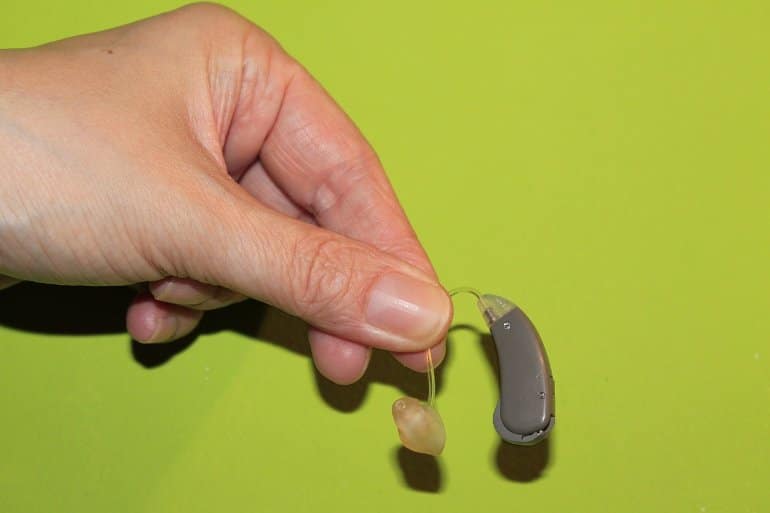Summary: In those with hearing loss, using hearing aids or cochlear implants was associated with a long-term reduction of cognitive decline by 19% and a 3% improvement in cognitive test scores.
Source: Alzheimer’s Research UK
Researchers have published findings which suggest that the use of hearing aids and cochlear implants can reduce the risk of developing dementia by slowing down cognitive decline, such as memory loss.
The use of hearing aids and cochlear implants by people with hearing loss was found to reduce long-term cognitive decline by 19%. Furthermore, the use of these devices led to a 3% improvement in cognitive test scores, including an individual’s ability to problem solve.
The results were published in JAMA Neurology, using a meta-analysis (a statistical analysis that combines the results of multiple scientific studies).
Dr. Susan Mitchell, Head of Policy at Alzheimer’s Research UK, said, “There’s increasingly clear evidence that people who lose their hearing as they get older are at increased risk of developing dementia. This study provides further compelling evidence of this link, but unanswered questions remain.
“Dementia research has made great strides in recent months, but there’s a long way to go—and interventions that can reduce people’s dementia risk must be a public health priority.

“People must be able to access hearing tests if they are concerned about their hearing, so suitable support, like hearing aids, can be offered at an early stage, and help maintain their brain health.
“Going forward, researchers must unpick exactly how hearing loss influences the risk of developing dementia. We also need to know who is most at risk and could benefit most from interventions like hearing aids.
“Knowing this will help health services allocate resources and support those that need it.”
About this dementia research news
Author: Press Office
Source: Alzheimer’s Research UK
Contact: Press Office – Alzheimer’s Research UK
Image: The image is in the public domain
Original Research: Closed access.
“Association of Hearing Aids and Cochlear Implants With Cognitive Decline and Dementia” by Brian Sheng Yep Yeo et al. JAMA Neurology
Abstract
Association of Hearing Aids and Cochlear Implants With Cognitive Decline and Dementia
Importance
Hearing loss is associated with cognitive decline. However, it is unclear if hearing restorative devices may have a beneficial effect on cognition.
Objective
To evaluate the associations of hearing aids and cochlear implants with cognitive decline and dementia.
Data Sources
PubMed, Embase, and Cochrane databases for studies published from inception to July 23, 2021.
Study Selection
Randomized clinical trials or observational studies published as full-length articles in peer-reviewed journals relating to the effect of hearing interventions on cognitive function, cognitive decline, cognitive impairment, and dementia in patients with hearing loss.
Data Extraction and Synthesis
The review was conducted in accordance with Preferred Reporting Items for Systematic Review and Meta-analyses (PRISMA) reporting guidelines. Two authors independently searched the PubMed, Embase, and Cochrane databases for studies relating to the effect of hearing interventions on cognitive decline and dementia in patients with hearing loss.
Main Outcomes and Measures
Maximally adjusted hazard ratios (HRs) were used for dichotomous outcomes and ratio of means for continuous outcomes. Sources of heterogeneity were investigated using sensitivity and subgroup analyses, and publication bias was assessed using visual inspection, the Egger test, and trim and fill.
Results
A total of 3243 studies were screened; 31 studies (25 observational studies, 6 trials) with 137 484 participants were included, of which 19 (15 observational studies, 4 trials) were included in quantitative analyses. Meta-analysis of 8 studies, which had 126 903 participants, had a follow-up duration ranging from 2 to 25 years, and studied long-term associations between hearing aid use and cognitive decline, showed significantly lower hazards of any cognitive decline among hearing aid users compared with participants with uncorrected hearing loss (HR, 0.81; 95% CI, 0.76-0.87; I2 = 0%). Additionally, meta-analysis of 11 studies with 568 participants studying the association between hearing restoration and short-term cognitive test score changes revealed a 3% improvement in short-term cognitive test scores after the use of hearing aids (ratio of means, 1.03; 95% CI, 1.02-1.04, I2 = 0%).
Conclusions and Relevance
In this meta-analysis, the usage of hearing restorative devices by participants with hearing loss was associated with a 19% decrease in hazards of long-term cognitive decline. Furthermore, usage of these devices was significantly associated with a 3% improvement in cognitive test scores that assessed general cognition in the short term. A cognitive benefit of hearing restorative devices should be further investigated in randomized trials.







